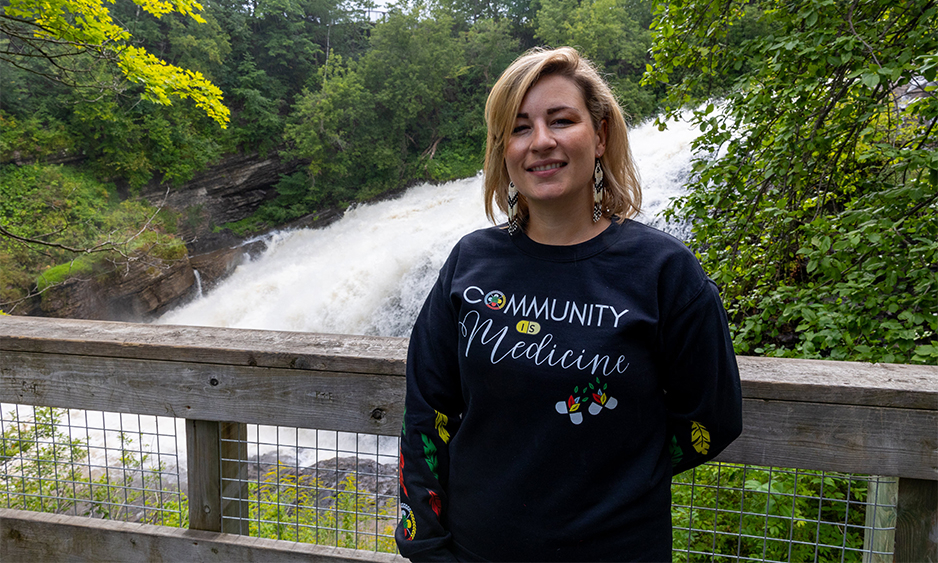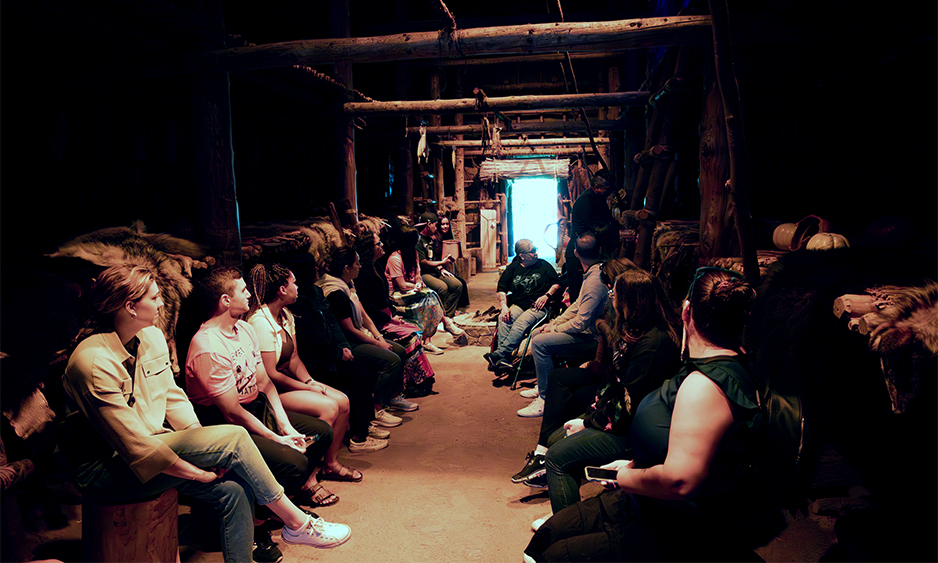Tyiesha Wright, a second-year PharmD student at the Leslie Dan Faculty of Pharmacy speaking at the Community is Medicine event at the Wendake urban reserve near Quebec City.
In late August, more than 20 Indigenous pharmacy professionals from across Canada came together for the Community is Medicine event, hosted by the Indigenous Pharmacy Professionals of Canada (IPPC) at the Wendake urban reserve near Quebec City. The unique event brought Indigenous pharmacists, pharmacy technicians, pharmacy assistants and students together to build community and participate in professional and cultural learning.
“We've existed for too long without a community of Indigenous pharmacy professionals in Canada. This isolation is ultimately why we created the IPPC and organized this event,” says Jaris Swidrovich, assistant professor – teaching stream and Indigenous engagement lead at the Leslie Dan Faculty of Pharmacy and founder and chair of the IPPC. “To have this community is incredible. This should have happened a long time ago, but everyone was grateful that it’s happening now.”
Established in 2022, the Indigenous Pharmacy Professionals of Canada (IPPC) is an Indigenous-led association that connects and supports Indigenous pharmacy professionals and helps all pharmacists provide better care to Indigenous patients. The first Community is Medicine event in 2023 in Saskatchewan was a relatively small gathering of primarily IPPC board members.
The second annual event, organized by IPPC executive director Amy Lamb, was significantly larger, with participation from First Nations, Métis and Inuit pharmacy students and professionals who are not part of the board. It was not only an opportunity for the IPPC board to undertake strategic planning and professional development but also for everyone in attendance to build connections and participate in cultural learning and ceremonies.
Participants had opportunities to learn about the Huron-Wendat Nation, whose traditional territories include what is now known as Quebec City, by exploring a replica longhouse and experiencing a multimedia exhibit about the origins of the Wendat People. They also had group discussions and presentations about Indigenous-led pharmacy practice.
Attendees participated in traditional naming ceremony
Swidrovich says one of the most meaningful experiences of the event was the traditional naming ceremony, led by Elder Blu Waters, a citizen of the Métis Nation of Ontario who provides ceremony, teaching and counselling. In many Indigenous cultures, traditional name callers receive an individual’s traditional name from their ancestors in the Spirit World through ceremony.
Tyiesha Wright, a second-year PharmD student at the Leslie Dan Faculty of Pharmacy and member-at-large of the IPPC, participated in the naming ceremony with Elder Blu. She agrees that it was a highlight of the event.
“This was something I’ve wanted to do for a number of years, but I never had the opportunity,” explains Wright. “The experience was able to reconnect me with my culture and those who came before me, and it was very close to my heart.”
“The experience was able to reconnect me with my culture and those who came before me, and it was very close to my heart.”
Born and raised in Winnipeg, Wright attended the 2023 Community is Medicine event after being accepted to the Leslie Dan Faculty of Pharmacy. She then became involved with IPPC and recently received the 2024-25 IPPC Indigenous Pharmacy Scholarship by Johnson & Johnson. She says the gatherings have helped her start her pharmacy career with a community of Indigenous role models in pharmacy.
“Going into pharmacy, I didn't know of any other Indigenous pharmacy professionals, and I felt kind of isolated,” she says. “The meeting last year was transformative. Seeing that there are other Indigenous pharmacy professionals out there gave me examples of what I could do with my pharmacy degree and how I could make change in my Indigenous community. I know that I'm not alone in the profession.”
Gathering helps participants reclaim traditions and ceremonies
For many of the pharmacy professionals in attendance, the gathering was the first time they had participated in some of the ceremonies – a long-lasting effect of Canada’s residential school system and the Sixties Scoop, which robbed many Indigenous Peoples of their communities, languages and traditions.
The event gave participants opportunities to reclaim some of the traditions, customs and ceremonies that were not available to – or even outlawed for – Indigenous Peoples in residential schools.
“A lot of us have been out of ceremony, maybe always, and this gathering brought all of that back,” says Swidrovich. “Folks were speaking their traditional languages, we did ceremony, and people were encouraged to wear their cultural regalia, all of which were banned in residential schools.”
“Our gathering allowed for a beautiful reclamation of First Nations, Inuit and Métis Peoples’ ways of knowing, being, thinking and doing.”
More News
Image
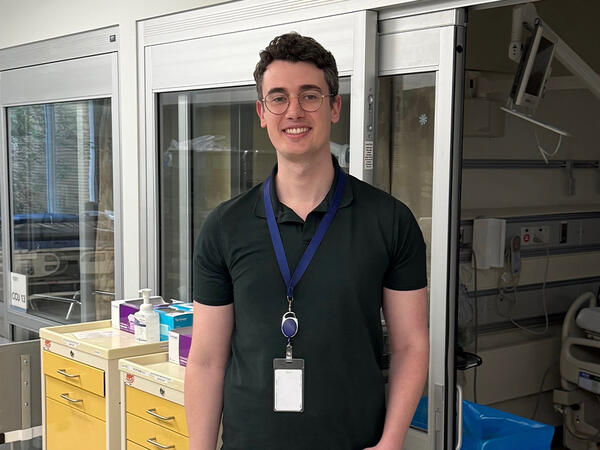
Pharmacy alum’s research shows how full-scope practice improves cancer care
Honoured with a national award, Adrian de Boer says his residency experience was a powerful reminder that he's making a meaningful change to the pharmacy profession.
Read More
Image
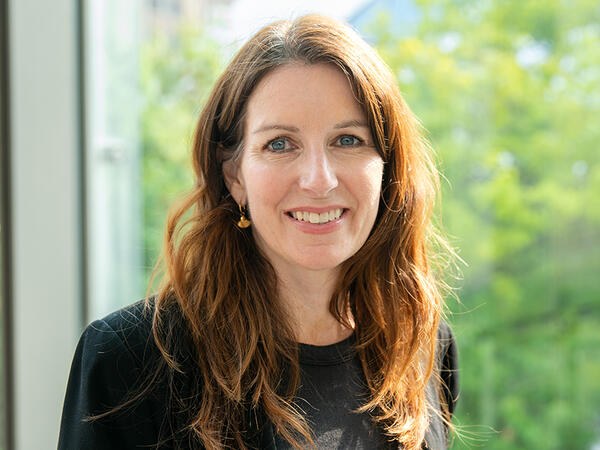
Pharmacy alum passionate about helping community pharmacists practice to full scope
As a pharmacy leader at Rexall, Heidi Wittke uses frontline experience to lead initiatives that improve patient care
Read More
Image
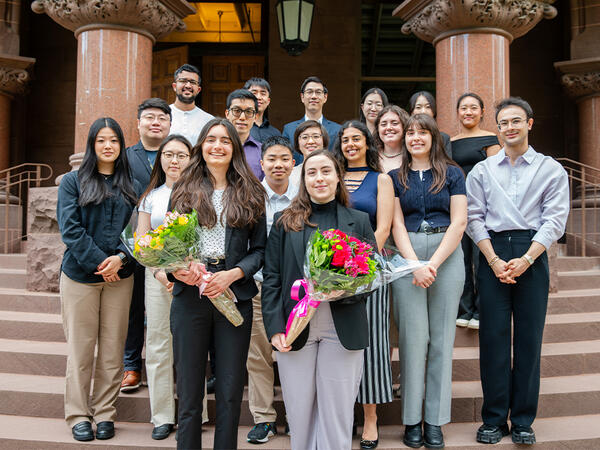
Bridging Research and Industry: GRIP 2025 highlights innovation and real-world impact
Over 200 attendees from academia, healthcare, and industry gathered last week for the 2025 GRIP symposium, celebrating the depth and diversity of graduate student research.
Read More

